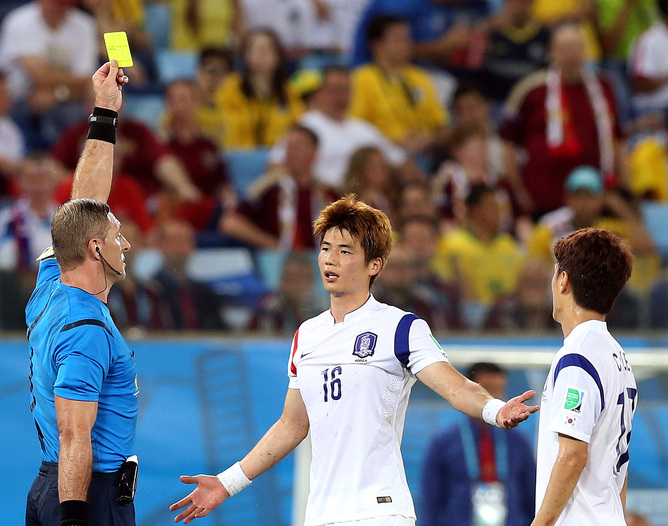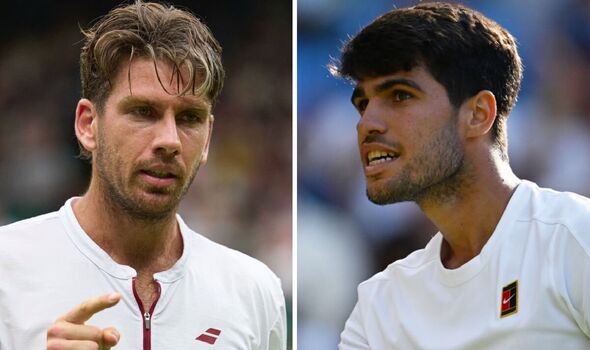
Jose Coelho/EPA
The World Cup brings together teams, players, fans and also referees from every corner of the globe. The cultural differences that exist between them can be stark, especially for referees. While players tend to play in different leagues around the world, referees tend to remain rooted in their domestic leagues. So, the appointment of 25 referee trios from 43 different countries inevitably raises questions concerning their quality and the consistency of their decision making.
When referees are trained and then officiate within their domestic leagues that particular league will influence their style of refereeing, how they deal with players and the decisions that they give at certain times. Bringing them all together every four years for a few weeks therefore requires a concerted effort by FIFA to ensure they officiate fairly and uniformly.
Officials are selected from the football confederations of every continent. Just as the World Cup brings together the best players, these are the best officials that each region has to offer. FIFA then works with each referee over the course of three years in the build-up to the World Cup.
To achieve uniformity FIFA have modernised training, bringing them together for regular seminars involving match video analysis. A significant focus of the technical training is around the importance of protecting players from any overly physical treatment from other players, protecting the image of the game, the way referees read the game and understanding different football mentalities and cultures.
Even within Europe there is significant variation between different leagues. Decisions are accepted in some leagues that would not be accepted in others. In European football, the common example given is that of the “raised foot”. In England this act is often let slide, whereas in Spain or Italy it is always a foul and more often than not brings a yellow or red card, depending on the challenge. At the World Cup, referees will be attempting to standardise their approach to the “raised foot”, but this may be an example of an area of discrepancy.
The way referees manage games can also differ. Referees in England, for example, try and manage the players and talk to them more, whereas referees in Spain and Italy prefer to use yellow and red cards as their way of controlling the players right from the start of a match. At the World Cup, referees tend to try to be more lenient and accepting of the different cultures. However, despite training and guidance referees can demonstrate behaviour and decision making that can be traced back to the domestic league and country which they officiate within.
The training is all about trying to standardise the way that referees officiate so players know what to expect during a match. Massimo Busacca, FIFA’s head of refereeing, says that there should be no change in performance by referees: “How it was interpreted before has to be how it is interpreted at the World Cup.”
An age-old issue
The issue of standardising the way refereeing is conducted around the world has long been discussed. In 1980, the English Referee’s Association wrote off the idea of standardisation as an impractical and impossible dream, when it was discussed in its official publication, The Football Referee.
Following the World Cup in 1990, the issue was once again raised after different styles of refereeing were witnessed at the tournament. An article in The Football Referee described “the arrogant dictatorship of Helmut Kohl (Austria), lack of consistency with Carlos Silva Valente (Portugal) [and] the weakness of Elias Guerrero (Ecuador) that contributed to common mistakes in Law”. Clearly in the 1990s there was an idea that standardisation between countries was an issue and warranted further consideration.
Referees today are aware there are differences in the way they prepare for a match and how they perform on the pitch itself. Referees recognise that their style of officiating is dependent on the league and culture to which they belong, as does FIFA, which says:
Football is a global sport and its rules must be interpreted and applied with absolute consistency wherever the game is played. FIFA therefore has a policy of ongoing training for its referees to ensure that refereeing standards continue to improve and the Laws of the Game are applied the same way everywhere.
It is a challenge for FIFA. The World Cup brings together referees from leagues and competitions all over the world, there is an acceptance that referees from different countries officiate differently in certain situations. FIFA is trying to minimise these differences through the training and pre-tournament preparation the referees have undertaken; however, only over the course of the tournament will we know whether this age-old question has been dealt with sufficiently. History certainly tells us it will not be easy.





